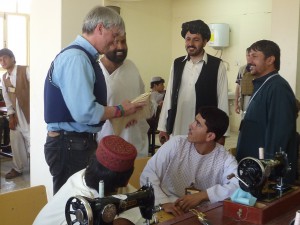1st August 2012 Harare, Zimbabwe
Reflections from the former Head of the PRT’s Socio-Economic Development Team
I have invited members of the PRT to use my blog to talk about their work and experiences in Helmand. Anna Morris the former Head of the PRT’s Socio-Economic Development Team has kindly written about her time here.

As I approach the end of my 16 months in Helmand questions from colleagues, friends and family have increased – as has the pressure to blog about my experience here. Not normally one to relish the limelight I’ve resisted calls for blogs. However, with my final week in Helmand coinciding with the one year anniversary of the start of Transition in the Provincial capital of Lashkar Gah, it seems I can resist no longer.
What will stay with me most from my time in Helmand are the people I’ve worked with and the day-to-day experiences in this unique environment. I’ve led the team working to support development across the Province – staff from UK, US, Danish and Estonian development agencies, working alongside US and UK military colleagues, and our Afghan local staff, to improve education, health, infrastructure and livelihoods. This melting-pot of different nationalities, cultures and customs has fostered some interesting events; it is not every office that celebrates both the Royal Wedding and US Independence day; enjoys Eid celebrations and different versions of Christmas traditions; or commemorates the deaths of fallen service men and women through regular vigils held on camp.
The team has supported some impressive developments in Helmand – building on the investments made by our military colleagues to bring about improvements in security. Over the past year I’ve visited towns and villages, and seen the difference over 120 new schools have made to children’s lives. I’ve seen the effect a secure, black-topped road linking districts such as Sangin and Marjah to the Provincial capital can have on peoples’ access to markets, jobs, basic services, and importantly their accountable provincial government representatives.

At the beginning of July I visited the DFID funded Mercy Corps vocational training centre with the Secretary of State for International Development, Andrew Mitchell. Over 7,000 students have graduated since spring 2011, and 85% have improved their incomes as a result. Mercy Corps now has centres in 7 districts– most notably in Sangin, once the scene of some of the highest levels of violence in Helmand.
The past year has seen a growing number of organisations operating across the Province. International NGOs like the International Rescue Committee are setting up offices with the aim of boosting service delivery to remote areas of the province; Afghan institutions, including the Afghan Technical and Vocational Institute, allow us to shift our capacity building support to Afghan led mechanisms that will remain post 2014; and UN agencies are increasing their engagement with visits by UNICEF & WHO. These new actors are vitally important as we look towards 2014 and the eventual closure of all Provincial Reconstruction Teams across Afghanistan.
As highlighted by the Prime Minister during his meeting with PRT staff in July, British and international assistance to Helmand and the whole of Afghanistan will continue long after 2014 – supported by recent funding commitments made at the Tokyo conference. However, most of our agencies will cease to have a presence in Helmand– operating instead from our offices in Kabul as is the norm in developing countries all around the world.
With more and more development actors willing and able to invest time, people and resources in the Province, I leave Helmand with increasing hope that the Afghan Government and donors will be able to sustain and build on the progress that I have witnessed.
Excellent article. I work in OCHA in the Southern Afghanistan, arrived to Kandahar recently. Unfortunately due to insecurity I am not able to visit remote areas, and this article gave me a good insight. Would be very happy to get in touch with Anna Moris to get more info.
Regards, Ulan Djumanaev, Humanitarian Affairs Officer, OCHA in Afghanistan.
Great to see the progress made. Well done for all your hard work, Anna!